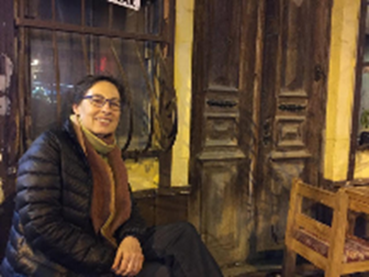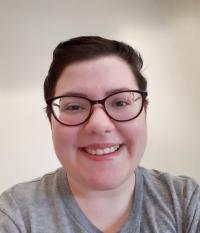MPK Faculty Team
UNIVERSITY OF CALIFORNIA, DAVIS

Dr. Suad Joseph, Ph. D.
Distinguished Research Professor, Anthropology and Gender, Sexuality & Women’s Studies
Faculty Advisor to the Chancellor
Suad Joseph is Distinguished Research Professor of Anthropology and Gender, Sexuality and Women's Studies and scholar of Middle East gender and family studies. She founded a group leading to the establishment of the Middle East Section of the American Anthropological Association; she founded the Association for Middle East Women's Studies and co-founded its internationally recognized journal – Journal of Middle East Women’s Studies; she founded the Arab Families Research Group; and a six-university consortium. She co-founded the Arab American Studies Association and the Association for Middle East Anthropology. She was the president of the Middle East Studies Association of North America, the main professional association for scholars of the Middle East. She co-founded the Women and Gender Studies Program and founded the Middle East/South Asia Studies Program at UC Davis. She is the recipient of numerous awards including: the UC Davis Prize for Undergraduate Teaching and Research, the largest such prize in the United States; the graduate mentor award by the Consortium for Women and Research, and the Diversity Leadership award and the Distinguished Scholarly Public Service Award by UC Davis. She is General Editor of the Encyclopedia of Women and Islamic Cultures- the first encyclopedia of its kind, which Choice, the magazine for librarians, ranked as “essential” for libraries. She has edited or co-edited 8 books, and published over 100 articles. For the past decade and half, she has offered training in proposal writing and research design to young scholars in the Middle East, Europe, and the United States.
Dr. Joseph’s research has focused on the relationships between religion and politics, family and the state, gender and citizenship, children and rights, and culturally specific notions of selfhood.
Research interests: Gender and citizenship; Family and child socialization; Family and state; Human rights and discourses of selfhood.
Email: sjoseph@ucdavis.edu
BIRZEIT UNIVERSITY

Dr. Lena Meari, Ph. D.
Assistant Professor Assistant Professor Department of Social and Behavioral Science
Acting Director, Institute of Women Studies
Lena Meari, was born in Haifa to a refugee family from Al-Birweh village. She has integrated in her academic training and research various disciplines including: anthropology, psychology as well as gender studies and development. She has taught and conducted research at Birzeit University and the University of California, Davis. After completing her PhD she spent a semester in the Center for Palestine Studies at Columbia University working on developing her PhD dissertation titled “Sumud: A Philosophy of Confronting Interrogation” which investigates the transforming colonial relations in colonized Palestine from the perspective of the interrogation-encounter.
Dr. Meari’ research interests are in the geopolitics of knowledge production, decolonized methodologies, colonial structures and colonial relations, the politics of sumud, revolutionary subjectivity, anti-colonial feminist theory, and critical approaches to the concept of development with emphasis on Palestine and the Arab World.
Research interests: geopolitics of knowledge production, decolonized methodologies, colonial structures and colonial relations, the politics of sumud, revolutionary subjectivity, anti-colonial feminist theory, and critical approaches to the concept of development with emphasis on Palestine and the Arab World.
Emails:
lmiari@birzeit.edu
lmeari@ucdavis.edu
AMERICAN UNIVERSITY OF CAIRO

Dr. Martina Rieker, Ph. D.
Director, Cynthia Nelson Institute for Gender and Women’s Studies The American University in Cairo
School of Global Affairs & Public PolicyMartina Rieker is the Director of the Institute for Gender and Women’s Studies at The American University in Cairo. The Institute hosts an MA program in Gender and Women’s Studies in the Middle East/ North Africa with three specializations: Gendered Political Economies, Gender and Women’s Studies in the Middle East/ North Africa and Geographies of Gender and Justice. Current research, with Hanan Sabea, includes Gendered Urban Precarities: A Knowledge Network (Cairo, Cochabamba, Georgetown, Ibadan, Mumbai, Ramallah, Shanghai) with York University (Social Science and Humanities Research Council (Canada) 2017-2023); Remaking Societies, Remaking Persons: A Supranational Forum for Memory Work with University of Western Cape, University of Ghana Legon, and Makerere University. (Mellon Foundation, 2018-2021). Publications include: Handbook on Gender and Cities, Linda Peake and Martina Rieker, Editors (Elgar, forthcoming 2019); Rethinking Feminist Interventions into the Urban. Linda Peake and Martina Rieker, Editors. (Routledge 2012); Comparing Cities: Middle East/ South Asia. Kamran Asdar Ali and Martina Rieker, Editors. (Oxford University Press 2010); Urban Margins: Envisioning the Global South. Guest Edited Issue by Kamran Asdar Ali and Martina Rieker, Social Text 95 (2008); Gendering Urban Space in the Middle East, South Asia and Africa. Kamran Asdar Ali and Martina Rieker, Editors. (Palgrave Press 2007).
Research interests: Critical geographies, Urbanism, Precarity, and Methodologies
Email: mrieker@aucegypt.edu
LEBANESE AMERICAN UNIVERSITY
Dr. Zina Sawaf, Ph. D.
Assistant Professor, Interdisciplinary Gender Studies
Zina Sawaf is an Assistant Professor of Interdisciplinary Gender Studies at the Lebanese American University. Previously, she was an Early Career Fellow with the Arab Council for the Social Sciences. A social Anthropologist, she has written and published on ethnographic practice in the Arab region, divorce and the state in Saudi Arabia and the history of anthropology in Lebanon. Her book project, “Encountering the State: Women and Intimate Lives in Riyadh, Saudi Arabia,” based on long-term ethnographic fieldwork in the Arabian Peninsula, is a study of embodied encounters between women and the processes, offices, and officials of the state, as well as its material culture.
Email: zina.sawaf@lau.edu.lb
AMERICAN UNIVERSITY OF SHARJAH

Dr. Nawar Al-Hassan Golley, Ph. D.
Professor, English Department
Coordinator of the Women’s Studies Minor
Nawar Al-Hassan Golley is Professor in literary and cultural theory and gender and women's studies at the American University of Sharjah, UAE. Al-Hassan Golley is the author of, Reading Arab Women's Autobiographies. Shahrazad Tells her Story (Texas University Press: 2003), editor of Arab Women's Lives Retold. Exploring Identity Through Writing (Syracuse University Press: 2007), co-editor of Mapping Arab Women’s Movements: A Century of Transformations from Within (American University in Cairo Press: 2012) and Guest Editor of HAWWA: Journal of Women of the Middle East and the Islamic World‘s Beyond Boundaries: Exploring Arab Women’s Autobiographical Narratives (Dec. 2014). Al-Hassan Golley is the founding Director of the United Arab Emirates Gender and Women’s Studies Consortium and organizer of its first conference on Gender and Women’s Studies in the Arab Region (March 7-9, 2012). She has organized several international conferences and has presented many papers at international conferences such as the Berkshire on the History of Women, National Women’s Studies Association (NWSA) and the Middle East Studies Association (MESA). She has published book chapters and articles in prestigious scholarly journals. In both her research and teaching, Al-Hassan Golley adopts an interdisciplinary approach drawing on her research interests in Critical and Literary Theory, Autobiography Theory, Postcolonial Literatures and Discourses, Feminism, and Arab Women’s Writings. Al-Hassan Golley is a regular commentator on gender-related issues in the media.
Research and Training areas: Women’s writings; Self-writing; Postcolonial literature and studies; Feminist theory and women and gender studies; Gender and feminism in the Middle East; Women’s movements.
Email: nhgolley@aus.edu
AMERICAN UNIVERSITY OF BEIRUT

Dr. Sara Mourad, Ph. D.
Assistant Professor of Media Studies and
Program Coordinator of Gender & Women’s Studies
Sara Mourad is an Assistant Professor in the Media Studies program. She works at the intersection of media studies, feminist theory, postcolonial theory, and queer studies. Her current research explores the role of media in the formation and expression of sexual subcultures and identities in postwar Lebanon. It examines gender and sexual non-conformity in television talk shows, literary texts, digital publications, and films to understand the shifting boundaries of publicity in contemporary Arab societies. Sara earned her BA in Political Science at the American University of Beirut and her PhD in Communication at the Annenberg School for Communication at the University of Pennsylvania. Her work has appeared in the International Journal of Communication, the Journal of Communication Inquiry, Critical Studies in Media Communication, and Jadaliyya.
Research interests: intersection of media, cultural studies, feminist theory, and queer studies. Her current research explores the role of media in the expression of gender and sexual dissent and the formation of queer and feminist subcultures and identities in postwar Lebanon. It examines gender and sexual non-conformity in television talk shows, literary texts, digital publications, and films to understand the shifting boundaries of publicity in contemporary Arab societies.
Emails:
sm96@aub.edu.lb
saramourad@gmail.com
THE ARAB COUNCIL FOR THE SOCIAL SCIENCES

Dr. Seteney Shami, Ph. D.
Director General
Seteney Shami is founding Director-General of the Arab Council for the Social Sciences since 2012. She is an anthropologist from Jordan and obtained her BA from the American University of Beirut and her MA and PhD from the University of California, Berkeley. After establishing the first graduate department of anthropology at Yarmouk University, Jordan, she moved in 1996 to the regional office of the Population Council in Cairo as director of the Middle East Awards in Population and the Social Sciences (MEAwards). In July 1999, she joined the Social Science Research Council in New York (from which she is currently on leave) as program director for the program on the Middle East and North Africa (currently) and the program on Eurasia (until 2010) and the program on InterAsia (since 2008). She has been a visiting professor at University of California, Berkeley, Georgetown University, University of Chicago, Stockholm University, and the Swedish Collegium for Advanced Study in the Social Sciences (Uppsala). Her fieldwork has focused on Jordan, Egypt, Turkey, and the North Caucasus. Her research interests center on issues of ethnicity and nationalism in the context of globalization, urban politics and state-building strategies, and population displacement and transnational mobility. Publications include the co-authored book (with Mitchell Stevens and Cynthia Miller-Idriss) Seeing the World: How US Universities make Knowledge in a Global Era (Princeton University Press 2018); edited volumes Middle East Studies for the New Millennium: Infrastructures of Knowledge (co-edited with Cynthia Miller-Idriss, NYU Press 2016); Publics, Politics and Participation: Locating the Public Sphere in the Middle East and North Africa (SSRC Books and Columbia University Press, 2009), and “Occluding Difference: Ethnic Identity and the Shifting Zones of Theory on the Middle East and North Africa” (co-authored with Nefissa Naguib), in Anthropology of the Middle East and North Africa: Into the New Millennium, S. Slyomovics and S. Hafez, eds., Indiana University Press, 2013.
Email: shami@ssrc.org
MPK Research Team

Joanna Abillama (she/her, they/them)
Joanna Abillama is an instructor in Gender Studies at the Lebanese American University. Previously, she has earned an MA in Interdisciplinary Gender Studies from the Lebanese American University, an MA in Theatre with a focus on Drama Therapy from Kansas State University as a Fulbright scholar, and a BA in Psychology from the American University of Beirut. Her research interests include gender bias in psychiatric diagnoses, lived experiences of mental illness and neurodivergence, performance theory, and the integration of arts-based methodologies.
Emails:
Lemirajoanna.abillama@lau.edu.lb

Dr. Meghan Klasic (she/her/hers)
Dr. Klasic is an interdisciplinary environmental geographer and Postdoctoral scholar working on the NSF-funded Long-Term Ecological Research (LTER) program in the Department of Forest Resources at the University of Minnesota. Her work, informed by 10 years working for the U.S. Environmental Protection Agency, broadly focuses on the drivers of policy change. Dr. Klasic focuses on three research veins: 1) science-policy disconnect and climate adaptation; 2) environmental risk and fragmented governance; and 3) urban justice and civic engagement. Dr. Klasic studies these themes across a variety socio-environmental governance cases including unconventional oil and gas drilling, drinking water, harmful algal blooms, and urban environmental advocacy. Dr. Klasic holds a PhD in Geography with a designated emphasis in Computational Social Science from the University of California, Davis.
Email: klasi004@umn.edu

Chris Choueiri
Chris(ty) Choueiri is a graduate student of English Literature at the American University of Beirut. Much of her research has focused on gender and sexuality, and she believes this to be the trajectory for her future career plans, whether they be academically oriented or not. Her thesis focuses on eroticized violence in Chuck Pahlaniuk’s Fight Club and on how this violence can be categorized as countercultural BDSM that challenges heterocapitalist norms. As such, Chris believes much of her future work will focus on the (criminally understudied) sub-field of BDSM, and the relationship between the fleshly, the violent, and the erotic. As with any academic, however, Chris’ interests are quite expansive, as she has recently found herself looking at contemporary representations of the grotesque within the new media (particularly on Youtube and Tiktok), at the relationship between shame, radical self-acceptance, and the medicalization of fat bodies, and at aesthetic (read: “pretty”) privilege and its relationship to class and gender performativity. Unsure of where she’ll be and what she’ll be doing within the coming years, Chris does know what she likes talking about (and will probably like talking about until the end of time): non-normative bodies, sex, and the governing systems that aim to surveil and regulate all that is aesthetic, fleshly, and “excessive”.
Email: cgc03@mail.aub.edu

Zaina Zarour
Zaina Zarour a researcher, translator and practitioner in the arts and culture fields in Palestine and the Arab region. She has earned her MA degree in Israeli Studies and BA degree in Media/ Radio Broadcasting & TV from Birzeit University. Her research interests focuse on religion and settler colonial feminism in addition to arts in the Arab region.
Email: zina.zarour@gmail.com